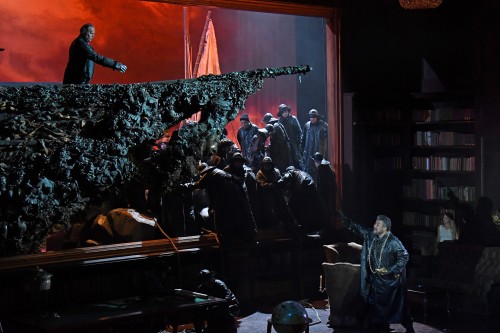 Spain Wagner, Der fliegende Holländer: Liceu Orchestra and Chorus / Oksana Lyniv (conductor), Gran Teatre del Liceu, Barcelona, 22 & 26.5.2017. (JMI)
Spain Wagner, Der fliegende Holländer: Liceu Orchestra and Chorus / Oksana Lyniv (conductor), Gran Teatre del Liceu, Barcelona, 22 & 26.5.2017. (JMI)

Cast:
Holländer – Egils Silins
Senta – Elena Popovskaya/Anja Kampe
Daland – Attila Jun
Erik – Daniel Kirch
Steuermann – Mikeldi Atxalandabaso
Frau Mary – Itxaro Mentxaka
Production:
Director – Philipp Stölzl
Sets – Philipp Stölzl and Conrad Moritz Reinhardt
Costumes – Ursula Kudrna
Lighting – Olaf Freese
The Liceu’s Flying Dutchman has been plagued by cancellations. Given this and a modern, somewhat disappointing production, the performances did not measure up to previous stagings of the opera in this house (the most recent was a concert version five years ago).
Philipp Stölzl’s staging was created for Opera Basel, where it was premiered eight years ago. His production was quite successful, and the Berlin Staatsoper took it, offering it for the first time four years ago. The action takes place in Daland’s mansion, where a young girl appears – none other than Senta – looking for a book that obsesses her: The Flying Dutchman. At the back of the room is a huge picture of a stormy sea which opens up to serve as the stage at the start of the opera. Thus the encounter of Daland and the Dutchman occurs only in the dreamy mind of Senta as she reads the story.
In Act II the Daland housemaids replace the chorus of spinners. Surprisingly, Daland makes his entrance accompanied not by the Dutchman but by Senta’s fiancé, an elderly man played by an actor. Senta continues with her dreams, once again opening up the large picture at the back where the Dutchman can be seen with the young Senta, who is interpreted by an actress. There are, therefore, two levels in scene: the real one with the singing Senta and her fiancé, and the one of the obsession on the upper stage. Without physical contact between the two singers, this duo does not work well.
In the third act we attend Senta’s wedding party. The guests are rather drunk, as are the newlyweds, and the calls of the Norwegians to the Dutch to wake up are directed here to Senta and her husband. She awakens and returns to her dreams while the guests are killed one by one; Senta kills her husband with a bottle. Everything ends with the appearance of the Dutchman at the seashore, accompanied by the actress Senta. The real Senta has completely lost her reason, and she cuts her throat, thus obtaining the Dutchman’s salvation.
The musical direction was entrusted to Oksana Lyniv, assistant to Kirill Petrenko in Munich. I’ve seen her on several occasions in the Bavarian capital and was not too enthusiastic. Something similar happened to me this time: her conducting was somewhat superficial, short of emotion and too loud on more than one occasion. The least convincing was the overture. Under her baton, the orchestra confirmed their improvement of recent years, and the chorus also gave a strong performance.
Normally, cancellations by singers are due to illness or temporary indispositions, but this does not seem to have been the case here. Thomas Johannes Mayer, originally announced as the Dutchman, officially cancelled because he has removed the character from his repertoire, which was rather surprising. Instead he was singing The Snow Maiden in Paris.
Albert Dohmen and Egils Silins were his substitutes. In these last performances of the run, the protagonist was sung by Silins, whose voice is appealing and well projected; he’s a good actor as well. He has proven to be one of the best interpreters of this character today, and I found him the best of the cast.
There were substitutes for Senta as well. Soprano Emma Vetter cancelled, and her first replacement was Elena Popovskaya, who was a better actress than a singer. Her voice has enough amplitude, but it’s not attractive. She’s rather tight at the top, where she borders on shouting – and did shout on more than one occasion.
In the last two performances of the run, Anja Kampe sang the part of Senta. After the performance, I looked back at my notes from previous performances by this soprano as Senta. I first heard her in the role 11 years ago and would write now exactly the same thing: she is an interpreter of a rare intensity with a powerful middle range. She has always been tighter at the top and that has not changed, but one almost forgets it, given her intense interpretation.
The only character who did not suffer cancellations was Daland, sung by bass Attila Jun. He was correct in the part though not brilliant, with a wide vibrato at the top.
Shawn Matthey also dropped out, and his replacement as Erik in these performances was tenor Daniel Kirch, who had the usual problems faced by other interpreters of the role.
In the secondary characters Mikeldi Atxalandabaso was excellent in the part of the Steuermann, and Itxaro Mentxaka did well as Frau Mary.
José M. Irurzun
